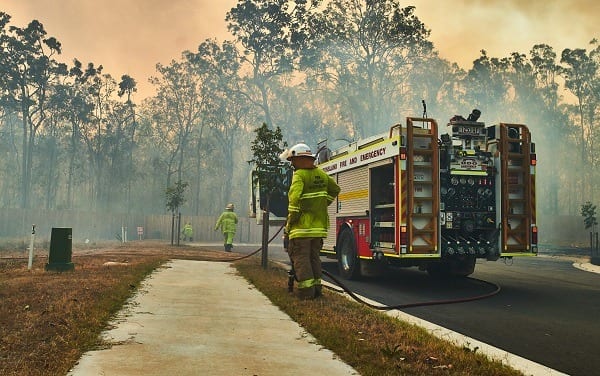As the COP25 climate change summit in Madrid enters its final few days, much of the east coast enters its fourth week shrouded in smoke with more than 100 bushfires still burning across NSW and Queensland.
According to the latest report from the World Meteorological Organisation, we are heading for a temperature increase of three degrees by the end of the century with “ever more harmful impacts on human wellbeing”.
Against such a bleak backdrop it will come as no surprise that Amnesty International’s global poll of young people – one of the largest it has ever undertaken – put climate change at the top of their list of worries. Global warming is the most pressing issue of our time. It seeps into our lungs every time we step outdoors.
What might be surprising though is our Future of Humanity poll focused on human rights, not climate change. Young people around the world were asked to give their views on the current state of human rights in their country, which issues they particularly care about, which rights they feel may be under threat, and whether their leaders are doing a good job with regard to human rights. More traditional human rights issues such as slavery, torture and discrimination were of course still a huge concern, but it was climate change and pollution that ranked the highest, both here in Australia and around the world.
What does climate change have to do with human rights? Why is a human rights organisation like Amnesty wading into the climate change debate? Article 3 of the Universal Declaration of Human Rights says everyone has the right to life, liberty and security of person. Climate change leads to extreme weather events – bushfires, drought, floods, severe storms – and these events affect a person’s security; they threaten life.
According to a special report by the UN Environment Programme, 150 million people or more could be displaced by the impacts of the climate crisis by 2050. Entire states are at risk of becoming uninhabitable as sea levels rise, including our neighbours in Kiribati, Tuvalu and our own citizens in the Torres Strait.
So what should governments do? Acknowledge that climate change is an existential threat to the security of each and everyone of us is a start, but they need to do a lot more to reduce emissions and limiting temperature and sea level rises.They must also help people adapt to climate change, and provide compensation to those who have lost their homes.
And they must introduce a Human Rights Act – an Act which will legally protect all of our inalienable and indivisible rights, an Act which will protect our security and our lives. Australia is the only common law country in the world that doesn’t have such an Act or a Bill of Rights.
Human rights should be at the heart of all policy decisions no matter who holds government and this can only be ensured if it is enshrined in law.
In our poll, more than half of young Australians said that protest and non-violent civil disobedience were effective ways to create positive human rights change. But even these rights – freedom of expression and assembly as set out in Article 20 of the Declaration – are being undermined by our politicians. Queensland recently rushed through legislation cracking down on climate protesters, the Tasmanian government is making the same move and our Federal Government has criticised protestors and threatened to ban secondary boycotts.
This pattern of behaviour, which follows recent efforts to restrict press freedom by our security agencies, threatens the fundamental values on which our democracy is built.
With so many people – young and old – worrying about the future, this is the time when the government should be stepping up to protect those values. It should be doing everything it can to protect our human rights. It should be introducing a Human Rights Act.

